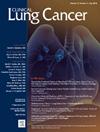Nonbacterial Thrombotic Endocarditis (NBTE) Treated With Crizotinib in Lung Adenocarcinoma Harboring ROS-1 Rearrangement: Two Case Report and Review of Literature
IF 3.3
3区 医学
Q2 ONCOLOGY
引用次数: 0
Abstract
- •Understanding nonbacterial endocarditis: the clinical suspicion of nonbacterial endocarditis (NBTE) should be raised in the presence of arterial embolic events in patients with highly thrombogenic tumors such as lung adenocarcinoma, the main cause of NBTE.
- •Association with ROS-1 rearrangements: patients with non-small cell lung cancer (NSCLC) carrying driver mutations have an elevated risk of thromboembolic events compared to those without them. These events can even serve as a sentinel sign of a possible relapse with a low disease burden.
- •Diagnostic approach: in case of clinical suspicion of NBTE, transthoracic echocardiography has a significant rate of false negatives, so a transesophageal echocardiogram is usually necessary.
- •Therapeutic approach and integration of targeted therapies: There are various scenarios in which cardiac surgery is indicated for endocarditis (such as neurological ischemic events or heart failure caused by valve failure). Regarding NBTE, the evidence in this regard is less solid, and the most relevant treatment is that of the underlying tumor. The use of targeted therapies against driver mutations in NSCLC offers a high rate of response, deep and rapid, which can also help achieve rapid control of complications derived from it that avoid performing invasive procedures with severe complications. This approach must always be discussed in a multidisciplinary board.
克唑替尼治疗伴有ROS-1重排的肺腺癌非细菌性血栓性心内膜炎(NBTE) 2例报告及文献复习。
•了解非细菌性心内膜炎:在高血栓形成性肿瘤(如肺腺癌,NBTE的主要原因)患者中出现动脉栓塞事件时,应提高对非细菌性心内膜炎(NBTE)的临床怀疑。•与ROS-1重排相关:携带驱动突变的非小细胞肺癌(NSCLC)患者发生血栓栓塞事件的风险高于未携带驱动突变的患者。这些事件甚至可以作为低疾病负担的可能复发的前哨信号。•诊断方法:临床怀疑NBTE时,经胸超声心动图假阴性率高,通常需要经食管超声心动图检查。•治疗方法和靶向治疗的整合:心内膜炎(如神经缺血性事件或由瓣膜衰竭引起的心力衰竭)需要心脏手术治疗的情况多种多样。关于NBTE,这方面的证据不太确凿,最相关的治疗是治疗基础肿瘤。针对NSCLC驱动突变的靶向治疗提供了高响应率,深度和快速,这也可以帮助实现由此产生的并发症的快速控制,避免进行具有严重并发症的侵入性手术。这种方法必须在多学科委员会中进行讨论。
本文章由计算机程序翻译,如有差异,请以英文原文为准。
求助全文
约1分钟内获得全文
求助全文
来源期刊

Clinical lung cancer
医学-肿瘤学
CiteScore
7.00
自引率
2.80%
发文量
159
审稿时长
24 days
期刊介绍:
Clinical Lung Cancer is a peer-reviewed bimonthly journal that publishes original articles describing various aspects of clinical and translational research of lung cancer. Clinical Lung Cancer is devoted to articles on detection, diagnosis, prevention, and treatment of lung cancer. The main emphasis is on recent scientific developments in all areas related to lung cancer. Specific areas of interest include clinical research and mechanistic approaches; drug sensitivity and resistance; gene and antisense therapy; pathology, markers, and prognostic indicators; chemoprevention strategies; multimodality therapy; and integration of various approaches.
 求助内容:
求助内容: 应助结果提醒方式:
应助结果提醒方式:


